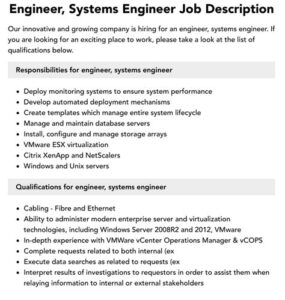Explore the essentials of Computer and Systems Engineering, key skills needed, its impact on technology, industry roles, and future career trends. In an era where technology shapes every aspect of our lives, Computer and Systems Engineering has emerged as a crucial discipline, intertwining the realms of computing and engineering to solve complex problems. This field not only lays the foundational principles of computer science but also emphasizes the integration of hardware and software systems to create innovative solutions. As industries evolve, the demand for skilled professionals in Computer and Systems Engineering continues to surge, driving technological advancements across various sectors. In this article, we delve into the basics of this dynamic field, explore the key skills required for success, and examine how it plays a pivotal role in shaping modern industries. Additionally, we will look at future trends and career opportunities, providing insights for those eager to embark on a rewarding journey in Computer and Systems Engineering.
Understanding The Basics Of Computer And Systems Engineering
Computer and systems engineering is a multidisciplinary field that blends the principles of computer science and engineering with the intricacies of system design, development, and implementation. This area focuses on creating and managing efficient and reliable software and hardware systems that meet complex requirements. Here’s a deeper look at its foundational aspects:
| Component | Description |
|---|---|
| Systems Theory | Understanding how different components of a system interact and how they can be optimized for performance. |
| Software Engineering | Applying engineering principles to software design and development to create scalable applications. |
| Hardware Systems | Designing and integrating hardware components for optimal functionality and efficiency. |
| Integration | Ensuring that various subsystems work together seamlessly to fulfill intended functions. |
| Project Management | Managing projects from conception to completion, including time, resources, and stakeholder expectations. |
The scope of computer and systems engineering extends to various applications, including embedded systems, networking, and cybersecurity. A firm grasp of these principles allows professionals to tackle real-world challenges effectively, leading to innovative solutions for both businesses and consumers.
Key Skills Required For Computer And Systems Engineering Professionals
In the rapidly evolving field of computer and systems engineering, professionals must cultivate a diverse set of skills to excel. Below are some of the essential skills and competencies that are crucial for success in this domain:
- Technical Proficiency: A strong foundation in programming languages such as Python, Java, and C++ is vital. Additionally, expertise in software development and systems integration is necessary to design and implement effective solutions.
- Problem-Solving Skills: The ability to analyze complex systems and troubleshoot issues is critical. System engineers often face intricate challenges that require innovative thinking and a logical approach.
- Analytical Skills: Professionals should be adept at interpreting data and utilizing analytical techniques to enhance system performance. This includes understanding algorithms and their applications in engineering.
- Project Management: As projects often involve cross-functional teams, skills in project management are essential. This includes planning, executing, and overseeing projects to meet deadlines and budgets.
- Communication Skills: Strong verbal and written communication skills are necessary for conveying technical information to non-technical stakeholders. Collaboration with various teams requires the ability to clearly articulate ideas and solutions.
- Adaptability: With technology constantly changing, professionals must stay current with the latest advancements in computer and systems engineering. Being open to learning new technologies and methodologies is crucial.
- Attention to Detail: Precision is paramount in engineering. A strong focus on detail helps ensure that systems operate correctly and efficiently, thus minimizing errors and maximizing performance.
By developing these key skills, professionals in computer and systems engineering can not only enhance their career prospects but also contribute significantly to the technological advancements that drive modern industries.
How Computer And Systems Engineering Drive Technological Advancements
The field of computer and systems engineering plays a pivotal role in driving technological advancements across various domains. By integrating both hardware and software components, professionals in this field create solutions that enhance efficiency, improve user experiences, and foster innovation.
One of the primary ways that computer and systems engineering contributes to technological progress is through the development of sophisticated software applications. These applications not only streamline processes but also provide users with powerful tools for data analysis, communication, and automation. For instance, advanced machine learning algorithms and artificial intelligence technologies are rooted in the principles established by this engineering discipline, leading to breakthroughs in healthcare, finance, and entertainment.
Moreover, computer and systems engineering facilitates the integration of systems, enabling different technologies to work together seamlessly. This interoperability is crucial for the development of the Internet of Things (IoT), where smart devices communicate and collaborate to improve productivity and quality of life. Engineers design robust frameworks that ensure reliable data exchange and communication protocols between various devices, allowing for innovative solutions such as smart homes and connected vehicles.
Additionally, the field is instrumental in the advancement of cybersecurity measures. As technology evolves, so do the threats that target systems. Computer and systems engineers develop security protocols and frameworks that protect sensitive information, ensuring the integrity and confidentiality of data transmitted across networks.
As we look to the future, the contributions of computer and systems engineering will only become more significant. Emerging technologies such as quantum computing and autonomous systems depend heavily on the foundational principles laid out by this engineering discipline. By continuing to innovate and refine complex systems, professionals in this field are not only responding to current technological needs but also anticipating future challenges and opportunities.
The Role Of Computer And Systems Engineering In Modern Industries
Computer and systems engineering plays a pivotal role in a wide array of modern industries, serving as the backbone for innovation and efficiency. It integrates principles from both computer science and engineering disciplines, allowing professionals to devise solutions that can improve systems and processes.
Here are some specific areas where computer and systems engineering is making a significant impact:
| Industry | Impact of Computer and Systems Engineering |
|---|---|
| Healthcare | Development of healthcare information systems, telemedicine applications, and medical devices integration. |
| Manufacturing | Implementation of automation systems, robotics, and IoT for optimized supply chain management. |
| Finance | Creation of secure transaction systems, fraud detection algorithms, and data analysis tools. |
| Telecommunications | Designing advanced communication systems and networks that enable seamless connectivity. |
| Transportation | Engineering of intelligent transportation systems, autonomous vehicles, and traffic management solutions. |
In addition to these industries, the role of computer and systems engineering extends to research and development initiatives. It fosters collaboration between cross-disciplinary teams, enhances system reliability, and ensures that technological advancements are both practical and sustainable.
As industries continue to evolve, the need for skilled professionals in computer and systems engineering is rapidly increasing, making it a vital field for the future of innovation and growth.
Future Trends In Computer And Systems Engineering Careers
The field of computer and systems engineering is constantly evolving, reflecting the rapid pace of technological advancement. As we look to the future, several key trends are emerging that are likely to shape careers in this discipline.
- Artificial Intelligence Integration: The incorporation of AI technologies into systems will demand engineers who can design and implement complex AI-driven solutions. Professionals who can navigate the intersection of computer and systems engineering with AI will be highly sought after.
- Increased Focus on Cybersecurity: With the growing dependence on digital systems, the need for robust cybersecurity measures is paramount. Graduates with expertise in protecting systems from cyber threats will find a wealth of opportunities.
- Advancements in IoT: The Internet of Things (IoT) continues to expand, requiring engineers to develop interconnected systems. Careers that focus on the integration and management of IoT devices will see significant growth.
- Cloud Computing Proficiency: As businesses migrate to cloud-based infrastructures, proficiency in cloud computing will be crucial. Engineers who specialize in designing system architectures compatible with cloud services will be at the forefront of the industry.
- Agile Development Methodologies: The shift towards agile methodologies in project management and software development is notable. Professionals that are adept in these practices will enhance project efficiency and adaptability.
- Ethical Technology Development: As technology becomes increasingly integrated into daily life, ethical considerations are becoming more important. Engineers who understand the societal impacts of their work will be valuable assets to organizations.
In summary, the future of careers in computer and systems engineering promises exciting opportunities driven by technological advancements and societal needs. By staying abreast of these trends, professionals will be better positioned to thrive in this dynamic field.
Frequently Asked Questions
What is Computer and Systems Engineering?
Computer and Systems Engineering is a multidisciplinary field that focuses on the design, analysis, and implementation of computer systems and their applications across various industries.
What skills are essential for a career in Computer and Systems Engineering?
Essential skills include programming, systems analysis, problem-solving, knowledge of algorithms and data structures, as well as an understanding of hardware components and network systems.
What types of careers are available in this field?
Careers in Computer and Systems Engineering include roles such as systems analyst, software developer, network engineer, cybersecurity specialist, and project manager.
How is Computer and Systems Engineering different from Computer Science?
While both fields overlap, Computer and Systems Engineering focuses on integrating hardware and software components in systems, while Computer Science primarily focuses on the theoretical and computational aspects of algorithms and data processing.
What industries commonly employ Computer and Systems Engineers?
Industries include telecommunications, healthcare, finance, transportation, and aerospace, where systems integration and technology deployment are critical.
What role does teamwork play in Computer and Systems Engineering projects?
Teamwork is vital as projects often require collaboration among diverse skill sets, integrating perspectives from engineers, programmers, and product managers to achieve successful outcomes.
What are the emerging trends in Computer and Systems Engineering?
Emerging trends include the increased use of artificial intelligence, machine learning, Internet of Things (IoT) applications, and advanced cybersecurity measures to safeguard systems.





